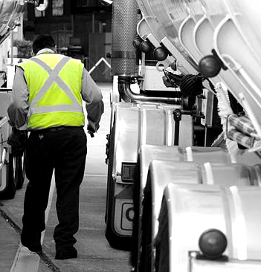Union demands better deal for tanker drivers' safety
 The Transport Workers Union has slammed safety standards for truck drivers in oil, fuel and gas transport.
The Transport Workers Union has slammed safety standards for truck drivers in oil, fuel and gas transport.
The Union says strong action must be taken to combat “horrific” safety standards among many tanker operators.
TWU has submitted a draft order to the Road Safety Remuneration Tribunal containing the following provisions, which it says would bolster safety in the deadly field;
- Clear maintenance policies and procedures so that all parts of the supply chain ensure vehicles are safe;
- Certainty around shift start and end times combined with safe rates of pay for time worked;
- Regular training covering dangerous goods protocols and methods to ensure drivers have the knowledge they need for safety;
- Ensuring big business clients, like large supermarkets and mining firms, take responsibility for vehicle maintenance and compliance for the trucks that transport their goods
The Union says industry figures show that the Australian tanker fleet is aging and unreliable, with one in four tanker drivers also facing economic pressure to speed.
TWU Assistant National Secretary Michael Kaine says petrol tankers are the most hazardous vehicles in an extremely dangerous industry.
“We've seen the consequences of poor maintenance standards - this week we've seen Cootes fined over $525,000 for hundreds of road safety breaches relating to vehicle defects, including faulty brakes and suspension,” Mr Kaine said.
“It's tragic it took the deaths of two people and another five injured in Mona Vale last year to force an investigation into Cootes vehicle maintenance.
“We saw another horrific accident in Wodonga in August where three people died in a tanker rollover. The causes are still under investigation, but one thing is clear - the community can't sit by while the death toll keeps rising.
“That's why the Union lodged a national dispute on tanker safety, and why we've presented the RSRT with a draft Order to clean up the sector and improve conditions.”
The RSRT exists to address pressures on the road transport industry, and has the power to issue binding orders on supply chain participants right up to the big companies like Woolworths or Coles.







 Print
Print